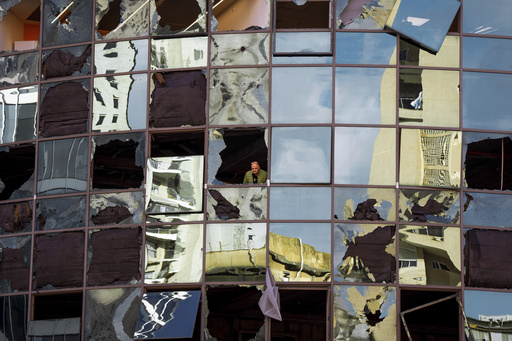
BEIRUT — A U.S. representative made a return visit to Beirut on Tuesday amid tentative positive responses from Lebanese leaders regarding a proposed cease-fire between Israel and Hezbollah. However, tensions in the Gaza Strip intensified as armed groups exacerbated an already dire food shortage by looting humanitarian aid trucks.
Amos Hochstein, who serves as the Biden administration’s point person for issues concerning Israel and Lebanon, arrived as allies of Hezbollah within the Lebanese government indicated their willingness to engage with the cease-fire proposal. This agreement would involve both Hezbollah and Israeli ground forces retreating from a U.N. buffer area situated in southern Lebanon.
The feasibility of concluding an agreement remains unclear. The U.N. buffer zone would require oversight from a significant number of additional U.N. peacekeepers alongside Lebanese troops. Israel has expressed a need for a stronger enforcement strategy, which might include operations against potential threats from Hezbollah—a notion that Lebanon could be hesitant to accept.
In Gaza, the looting of nearly 100 aid trucks over the weekend led to skyrocketing prices and shortages in central areas, particularly affecting the 2.3 million residents, many of whom have fled to overcrowded tent camps.
A severe hunger crisis is emerging in northern Gaza, where Israel has been conducting a prolonged military offensive, resulting in the death of hundreds and the displacement of tens of thousands from their homes. Experts fear that conditions may have deteriorated into famine.
In the central city of Deir al-Balah, residents lined up outside a closed bakery. One woman, displaced from Gaza City and known as Umm Shadi, revealed that flour prices had surged to approximately 400 shekels (over $100) per bag, if it could be found at all. Another local, Nora Muhanna, expressed her frustration after waiting five hours without obtaining bread for her children, lamenting the lack of goods coupled with a scarcity of cash.
The United Nations reported that 98 trucks carrying food and other essential supplies were stolen by armed individuals, marking the largest such incident since the onset of the conflict. The particulars surrounding the theft remain undisclosed.
U.N. spokesman Stephane Dujarric stated that an initial convoy of 109 trucks had been rerouted by the Israeli military to an “alternative, unfamiliar route” after passing through the Kerem Shalom crossing, with the trucks reportedly stolen near the crossing. Israel has previously accused Hamas of appropriating aid shipments, claims that Hamas has consistently denied.
Reportedly, Al-Aqsa TV—managed by Hamas—asserted that Gaza’s security forces took action against looters, resulting in 20 fatalities among them. The report suggested that individuals from tribal groups near Rafah may have been implicated in the looting.
Prior to the current conflict, the Hamas-led government employed a police force of tens of thousands that maintained considerable public order. However, this force has largely disappeared from many areas, which have become targets of Israeli military action. Hamas asserts it is taking steps to curb both looting and further price inflation in local markets.
The conflict ignited when Hamas militants infiltrated Israel on October 7, 2023, resulting in the death of around 1,200 individuals, primarily civilians, and the abduction of approximately 250 people. Currently, about 100 hostages are believed to still be in Gaza, with at least a third presumed dead.
In response, Israel’s military operations have reportedly led to the deaths of over 43,800 Palestinians, with local health authorities indicating that more than half of those casualties were women and children. This war has devastated much of Gaza and forced nearly 90% of its population to flee, often repeatedly.
In solidarity with Hamas, Hezbollah began launching rockets into northern Israel shortly after the initial Hamas attack, which sparked a cycle of retaliatory strikes and escalating conflict. Recent reports indicate that more than 3,500 individuals have been killed in Lebanon, with roughly 15,000 wounded, while about 1.2 million people have been displaced—approximately a quarter of Lebanon’s population. On the Israeli side, losses include 87 military personnel and 50 civilians due to various attacks.
The Biden administration has been working for months to secure ceasefire agreements on both fronts and appears to have made advances in negotiations in Lebanon. However, discussions regarding a cease-fire and hostage negotiations in Gaza have stalled in recent months.
U.S. President-elect Donald Trump has promised to pursue an end to the ongoing conflicts in the Middle East without detailing a specific strategy, having previously been a strong supporter of Israel during his first administration.
